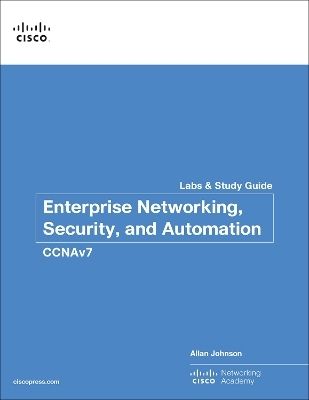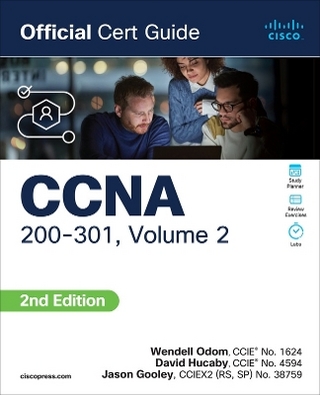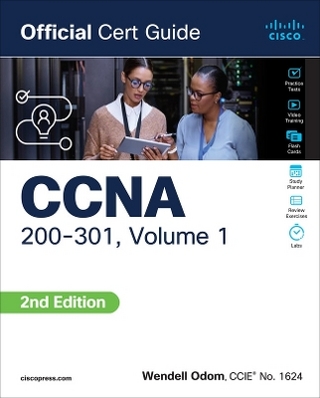
Enterprise Networking, Security, and Automation Labs and Study Guide (CCNAv7)
Cisco Press (Verlag)
978-0-13-663469-0 (ISBN)
Each chapter of this book is divided into a Study Guide section followed by a Lab section.
The Study Guide section offers exercises that help you learn the concepts, configurations, and troubleshooting skills crucial to your success as a CCNA exam candidate. Each chapter is slightly different and includes some or all the following types of exercises:
Vocabulary Matching Exercises
Concept Questions Exercises
Skill-Building Activities and Scenarios
Configuration Scenarios
Packet Tracer Exercises
Troubleshooting Scenarios
The Labs & Activities include all the online course Labs and Packet Tracer activity instructions. If applicable, this section begins with a Command Reference that you will complete to highlight all the commands introduced in the chapter.
This book is offered exclusively for students enrolled in Cisco Networking Academy courses. It is not designed for independent study or professional certification preparation. Visit netacad.com to learn more about program options and requirements.Related titles: CCNA 200-301 Portable Command Guide Book: 9780135937822 eBook: 9780135937709 Enterprise Networking, Security, and Automation Companion Guide CCNAv7 Book: 9780136634324 eBook: 9780136634249 Enterprise Networking, Security, and Automation Course Booklet CCNAv7 Book: 9780136634737
Cisco Networking Academy is an innovative Cisco education initiative that delivers information and communication technology skills to improve career and economic opportunities around the world. The Academy provides online courses, interactive tools, and lab activities to prepare individuals for information technology and networking careers in virtually every industry. Author: Allan Johnson entered the academic world in 1999, after 10 years as a business owner/operator, to dedicate his efforts to his passion for teaching. He holds both an M.B.A. and an M.Ed. in training and development. He taught CCNA courses at the high school level for 7 years and has taught both CCNA and CCNP courses at Del Mar College in Corpus Christi, Texas. In 2003, Allan began to commit much of his time and energy to the CCNA Instructional Support Team, providing services to Networking Academy instructors worldwide and creating training materials. He now works full time for Cisco Networking Academy as Curriculum Lead. Technical Reviewer: Dave Holzinger has been a curriculum developer, project manager, author, and technical editor for Cisco Networking Academy in Phoenix since 2001. Dave works on the team that develops Cisco Networking Academy’s online curricula, including CCNA, CCNP, and IT Essentials. He has been working with computer hardware and software since 1981. Dave has certifications from Cisco, BICSI, and CompTIA.
Introduction xxvi
Chapter 1 Single-Area OSPFv2 Concepts 1
Study Guide 2
OSPF Features and Characteristics 2
OSPF Packets 5
OSPF Operation 8
Labs and Activities 13
Chapter 2 Single-Area OSPFv2 Configuration 15
Study Guide 16
OSPF Router ID 16
Point-to-Point OSPF Networks 19
Multiaccess OSPF Networks 21
Modify Single-Area OSPFv2 24
Default Route Propagation 28
Verify Single-Area OSPFv2 29
Labs and Activities 33
Command Reference 33
2.2.13 Packet Tracer—Point-to-Point Single-Area OSPFv2 Configuration 34
2.3.11 Packet Tracer—Determine the DR and BDR 37
2.4.11 Packet Tracer—Modify Single-Area OSPFv2 41
2.5.3 Packet Tracer—Propagate a Default Route in OSPFv2 44
2.6.6 Packet Tracer—Verify Single-Area OSPFv2 46
2.7.1 Packet Tracer—Single-Area OSPFv2 Configuration 50
2.7.2 Lab—Configure Single-Area OSPFv2 52
Chapter 3 Network Security Concepts 57
Study Guide 58
Current State of Cybersecurity 58
Threat Actors 60
Threat Actor Tools 62
Malware 65
Common Network Attacks 68
IP Vulnerabilities and Threats 71
TCP and UDP Vulnerabilities 75
IP Services 78
Network Security Best Practices 81
Cryptography 85
Labs and Activities 91
3.5.7 Lab—Social Engineering 91
3.8.8 Lab—Explore DNS Traffic 93
Chapter 4 ACL Concepts 101
Study Guide 102
Purpose of ACLs 102
Wildcard Masks in ACLs 103
Guidelines for ACL Creation 106
Types of IPv4 ACLs 107
Labs and Activities 110
4.1.4 Packet Tracer—Access Control List Demonstration 110
Chapter 5 ACLs for IPv4 Configuration 113
Study Guide 114
Configure Standard IPv4 ACLs 114
Modify IPv4 ACLs 117
Secure VTY Ports with a Standard IPv4 ACL 118
Configure Extended IPv4 ACLs 118
Labs and Activities 124
Command Reference 124
5.1.8 Packet Tracer—Configure Numbered Standard IPv4 ACLs 125
5.1.9 Packet Tracer—Configure Named Standard IPv4 ACLs 128
5.2.7 Packet Tracer—Configure and Modify Standard IPv4 ACLs 130
5.4.12 Packet Tracer—Configure Extended ACLs—Scenario 1 137
5.4.13 Packet Tracer—Configure Extended IPv4 ACLs—Scenario 2 142
5.5.1 Packet Tracer—IPv4 ACL Implementation Challenge 146
5.5.2 Lab—Configure and Verify Extended IPv4 ACLs 149
Chapter 6 NAT for IPv4 155
Study Guide 156
NAT Characteristics 156
Types of NAT 157
NAT Advantages and Disadvantages 158
Static NAT 159
Dynamic NAT 161
PAT 162
NAT64 165
Labs and Activities 166
Command Reference 166
6.2.7 Packet Tracer—Investigate NAT Operations 166
6.4.5 Packet Tracer—Configure Static NAT 170
6.5.6 Packet Tracer—Configure Dynamic NAT 172
6.6.7 Packet Tracer—Configure PAT 173
6.8.1 Packet Tracer—Configure NAT for IPv4 175
6.8.2 Lab—Configure NAT for IPv4 176
Chapter 7 WAN Concepts 185
Study Guide 186
Purpose of WANs 186
WAN Operations 188
Traditional WAN Connectivity 191
Modern WAN Connectivity 193
Internet-Based Connectivity 194
Labs and Activities 196
7.5.11 Lab—Research Broadband Internet Access Technologies 196
7.6.1 Packet Tracer—WAN Concepts 199
Chapter 8 VPN and IPsec Concepts 203
Study Guide 204
VPN Technology 204
Types of VPNs 207
IPsec 211
Labs and Activities 219
Chapter 9 QoS Concepts 221
Study Guide 222
Network Transmission Quality 222
Traffic Characteristics 224
Queuing Algorithms 225
QoS Models 229
QoS Implementation Techniques 231
Labs and Activities 236
Chapter 10 Network Management 237
Study Guide 238
Device Discovery with CDP and LLDP 238
NTP 241
SNMP 243
Syslog 245
Router and Switch File Maintenance 247
IOS Image Management 251
Labs and Activities 254
Command Reference 254
10.1.5 Packet Tracer—Use CDP to Map a Network 255
10.2.6 Packet Tracer—Use LLDP to Map a Network 259
10.3.4 Packet Tracer—Configure and Verify NTP 264
10.4.10 Lab—Research Network Monitoring Software 266
10.6.10 Packet Tracer—Back Up Configuration Files 269
10.6.11 Lab—Use Tera Term to Manage Router Configuration Files 271
10.6.12 Lab—Use TFTP, Flash, and USB to Manage Configuration Files 277
10.6.13 Lab—Research Password Recovery Procedures 290
10.7.6 Packet Tracer—Use a TFTP Server to Upgrade a Cisco IOS Image 293
10.8.1 Packet Tracer—Configure CDP, LLDP, and NTP 296
10.8.2 Lab—Configure CDP, LLDP, and NTP 298
Chapter 11 Network Design 305
Study Guide 306
Hierarchical Networks 306
Scalable Networks 309
Switch Hardware 310
Router Hardware 312
Labs and Activities 315
11.5.1 Packet Tracer—Compare Layer 2 and Layer 3 Devices 315
Chapter 12 Network Troubleshooting 319
Study Guide 320
Network Documentation 320
Troubleshooting Process 325
Troubleshooting Tools 330
Symptoms and Causes of Network Problems 333
Troubleshooting IP Connectivity 335
Labs and Activities 336
12.5.13 Packet Tracer—Troubleshoot Enterprise Network 336
12.6.1 Packet Tracer—Troubleshooting Challenge—Document the Network 343
12.6.2 Packet Tracer—Troubleshooting Challenge—Use Documentation to Solve Issues 346
Chapter 13 Network Virtualization 349
Study Guide 350
Cloud Computing 350
Virtualization and Virtual Network Infrastructure 351
Software-Defined Networking 353
Controllers 355
Labs and Activities 358
13.6.1 Lab—Install Linux in a Virtual Machine and Explore the GUI 358
Chapter 14 Network Automation 363
Study Guide 364
Automation Overview 364
Data Formats 365
APIs 367
REST 369
Configuration Management 371
IBN and Cisco DNA Center 372
Labs and Activities 378
TOC, 9780136634690, 8/6/2020
| Erscheinungsdatum | 31.12.2019 |
|---|---|
| Reihe/Serie | Lab Companion |
| Verlagsort | Indianapolis |
| Sprache | englisch |
| Maße | 216 x 276 mm |
| Gewicht | 1020 g |
| Themenwelt | Schulbuch / Wörterbuch |
| Informatik ► Weitere Themen ► Zertifizierung | |
| Wirtschaft ► Betriebswirtschaft / Management | |
| ISBN-10 | 0-13-663469-9 / 0136634699 |
| ISBN-13 | 978-0-13-663469-0 / 9780136634690 |
| Zustand | Neuware |
| Haben Sie eine Frage zum Produkt? |
aus dem Bereich


